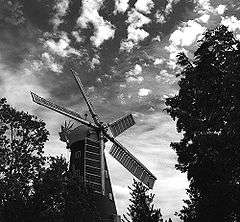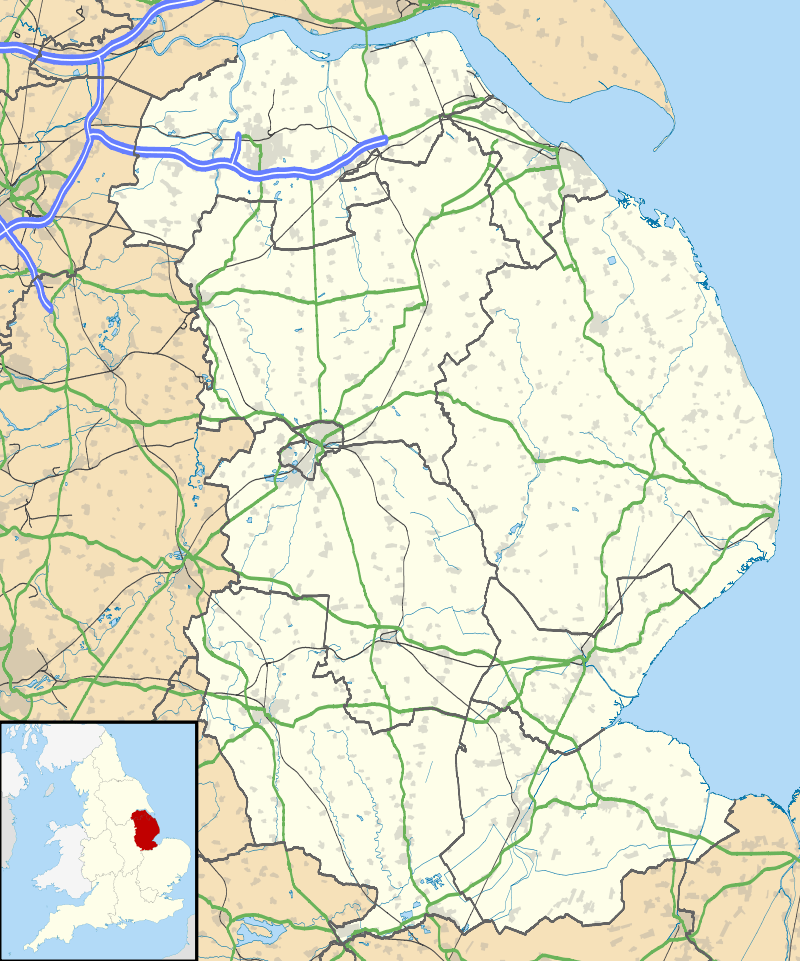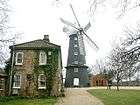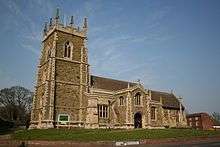Alford, Lincolnshire
| Alford | |
 Alford Windmill |
|
 Alford |
|
| Population | 3,459 (2011) |
|---|---|
| OS grid reference | TF454758 |
| – London | 120 mi (190 km) SSW |
| Civil parish | Alford |
| District | East Lindsey |
| Shire county | Lincolnshire |
| Region | East Midlands |
| Country | England |
| Sovereign state | United Kingdom |
| Post town | ALFORD |
| Postcode district | LN13 |
| Dialling code | 01507 |
| Police | Lincolnshire |
| Fire | Lincolnshire |
| Ambulance | East Midlands |
| EU Parliament | East Midlands |
| UK Parliament | Louth and Horncastle |
|
|
Coordinates: 53°16′N 0°11′E / 53.26°N 0.18°E
Alford (pronounced "Olford") is a town in Lincolnshire, England, about 11 miles (18 km) north-west of the coastal resort of Skegness, at the foot of the Lincolnshire Wolds, an Area of Outstanding Natural Beauty. Its population was 3,459 in the 2011 Census.[1]
Governance
An electoral ward of the same name exists. It stretches east to the coast, with a population of 4,531, as recorded in the 2011 census.[2]
Amenities
Alford's retail outlets cater mainly for local demand. Shops include a pharmacy, a grocery, and DIY and homeware stores. There are two supermarkets, in Church Street and West Street. The five public houses are the Half Moon Hotel, Windmill Hotel, George,[3] Anchor and White Hart. The town has branches of Lloyds Bank and the Yorkshire Building Society.
National Health and private dentists are located in South Street and Merton Lodge, and there is a doctors' surgery in West Street. A crematorium opened on the outskirts in 2008.
Market day in Alford is Tuesday. The main market is held in the Market Place,[4] with stalls of groceries and other small items. Alford's Craft Market has been held every August bank holiday since the 1970s in the grounds of the manor house. The cattle market closed in 1987.[5] A smaller weekly market is held in the Corn Exchange every Tuesday and Friday. Since Christmas 2005, European markets have been held on public holidays. Traders from the near continent mainly sell food items.
Economy and transport

Beeching's Way Industrial Estate in the south-west of the town includes companies for printing and manufacturing, a builders' merchant, and a postal sorting office.
The estate is built on the right-of-way of the East Lincolnshire Railway line from Grimsby to Boston, which closed on 5 October 1970 along with the local station. The naming of the industrial estate as Beeching's Way is a wry reminder of Richard Beeching, who masterminded the nationwide cutbacks in the then publicly owned British Railways.
The town's former largest employer, known as C. S. Martin and later Finnveden Powertrain Ltd, closed its doors in 2010. Following redundancies, the factory now operates as Gnutti Carlo UK Ltd.
There is a daytime, Monday-to-Friday bus service to Skegness,[6] a single Wednesday service on to Boston,[7] and occasional local and school bus services open to other passengers.[8]
Population
| Population of Alford Civil Parish | |||||||||||
|---|---|---|---|---|---|---|---|---|---|---|---|
| Year | 1881 | 1891 | 1901 | 1911 | 1921 | 1931 | 1951 | 1961 | 2001 | 2011 | |
| Population[9] | 2,894 | 2,843 | 2,478 | 2,394 | 2,194 | 2,227 | 2,218 | 2.139 | 3,231 | 3,459 | |
Landmarks
Windmill

Alford is known for its Grade I listed five-sailed windmill, a tower mill built in 1837 by Sam Oxley, an Alford millwright. In its heyday it was capable of grinding 4 to 5 tons of corn per day. The mill operated until 1955.
After two years' standing idle, it was restored to full working order in 1957. It is used commercially to produce stone-ground organic flour and cereal. It is the only windmill surviving in Alford. In 1932 there were three, each with a different number of sails (four, five and six).
Alford has one of several working windmills in Lincolnshire. Others can be found at Lincoln, Heckington, Boston, Waltham, Kirton in Lindsey, Sibsey and Burgh le Marsh.
Alford Manor House

The town's Manor House is one of the largest thatched manor houses in the country. In 2006 it was refurbished through National Lottery funding in association with English Heritage; interactive exhibits were installed and accessibility increased for disabled visitors. The manor house has a tea room and open gardens.
Churches

The medieval Anglican parish church of Alford is dedicated to St Wilfrid. Built in the 14th century, with restoration and additions from 1860, it is situated at the junction between Church, South and West Streets. It includes St Lawrence Chapel. Original features include a 14th-century screen, a Jacobean pulpit, traces of 16th-century glass, and a 17th-century tomb in the chancel. In the Elizabethan era, it hosted a local primary school.[10]
The church holds a variety of worship services, and annual community events such as a flower show. There is a war memorial in the churchyard for local people who died in the two world wars and in Northern Ireland.[11]
Alford also has a Methodist church, an Independent Congregational church, and Alford Christian Fellowship.
Approximately 4 miles (6 km) from Alford, in the village of Markby, is St Peter's Church, the only remaining thatched church in Lincolnshire.
Education
Primary education is provided by Alford Primary School.[12]
Alford secondary schools are Queen Elizabeth's Grammar School and John Spendluffe Technology College.[13] The Grammar school was judged as "Outstanding" in the Ofsted inspection of 2007; the Technology College received an "Outstanding" report from Ofsted in 2010.
 |
Aby with Greenfield, Muckton, Louth | Saleby, Strubby, Saltfleetby | Markby, Sutton on Sea, Mablethorpe |  |
| Haugh, Calceby, Lincoln | |
Bilsby, Huttoft, Anderby | ||
| ||||
| | ||||
| Well, Ulceby, Horncastle | Willoughby, Welton le Marsh, Spilsby | Mumby, Hogsthorpe, Chapel St Leonards |
Notable people
- Susanna Cole (1633 – c. 1713), born in Alford, captured and raised by American Indians after family massacred at New Netherland
- Elizabeth Dawbarn (died 1839), born in Alford, was a religious pamphleteer.
- William Charles Ellis (1780–1839), born in Alford, pioneer in the treatment of mental illness
- George Manville Fenn (1831–1909), novelist, taught in Alford.[14]
- John Comyn Higgins, who worked for the Indian Civil Service between 1910 and 1933, and was political agent and president of the Manipur Darbar, whose family lived at Alford Manor House.[15]
- Anne Hutchinson, born Anne Marbury (1591–1643), Puritan settler and religious reformer in New England[16]
- Captain John Smith (1580–1631), explorer, lived in Great Carlton, 4 miles (6.4 km) to the north and went to school in Alford.[17]
- William Wentworth (1616–1697), born in Alford, was a follower of the Puritan John Wheelwright and an early settler in New Hampshire.
See also
References
- ↑ "Parish population 2011". Neighbourhood Statistics. Office for National Statistics. Retrieved 18 August 2015.
- ↑ "Ward population 2011". Neighbourhood Statistics. Office for National Statistics. Retrieved 22 August 2016.
- ↑ George.
- ↑ Photograph of the Market Place
- ↑ Alford Town Retrieved 22 August 2016.
- ↑ Bus Times Retrieved 22 August 2016.
- ↑ Hunt's Retrieved 22 August 2016.
- ↑ Hunt's Retrieved 22 August 2016.
- ↑ "Vision of Britain". Retrieved 23 August 2011.
- ↑ "St Wilfrid's Church, Alford" (includes photos), Alford Group of Parishes, 2010-2014, accessed 7 August 2014
- ↑ Roll of Honour Retrieved 22 August 2016.
- ↑ Alford Primary School
- ↑ John Spendluffe Technology College
- ↑ ODNB. Retrieved 15 May 2014, pay-walled.
- ↑ Sonwalkar, Prasun (21 August 2016). "A corner of England cherishes links with Manipur". Hindustan Times. Retrieved 22 August 2016.
- ↑ Who Was Who in America, Historical Volume, 1607-1896. Chicago: Marquis Who's Who. 1963.
- ↑ Barbour, Philip L: The Three Worlds of Captain John Smith, pp. 5-7. Houghton Mifflin Company Boston, 1964.
External links
| Wikivoyage has a travel guide for Alford (Lincolnshire). |
![]() Media related to Alford, Lincolnshire at Wikimedia Commons
Media related to Alford, Lincolnshire at Wikimedia Commons
- Alford Town Council website
- Five Sailed Windmill, Alford
- Alford Group of Churches website
- Alford Town website
- Alford in the Domesday Book